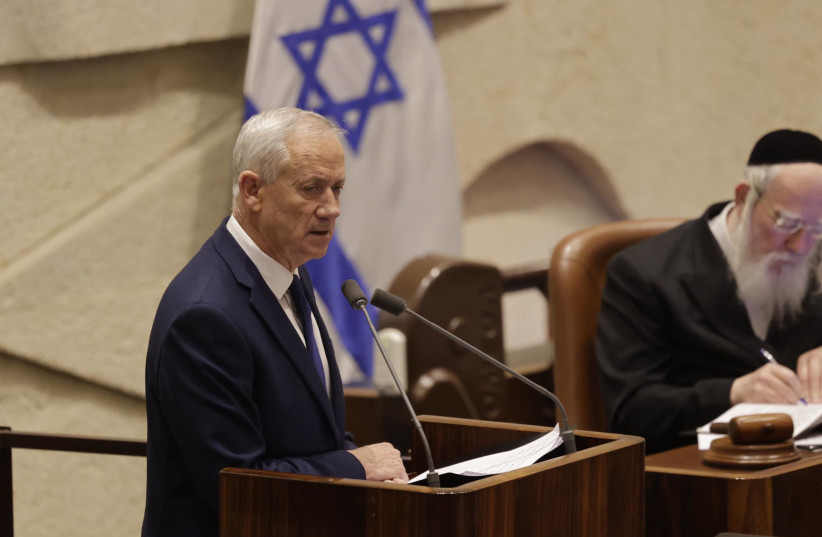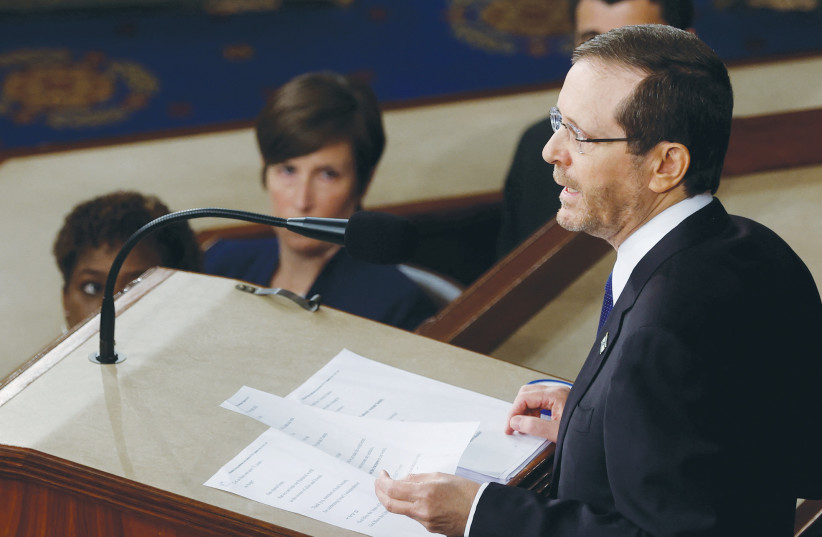Reasonableness bill passes 64-0 after compromise falls at last minute
The reasonableness standard bill has officially passed into law, marking the first bill in the government’s contentious judicial reform to pass into law after six months of fierce public debate and negotiations on a possible compromise that lasted until the last minute.
The opposition boycotted the vote, and the final tally was 64-0. Every member of the coalition voted in favor of the bill.
The voting on the bill’s second reading included 140 objections and lasted a number of hours.
The voting began after a marathon 26-hour debate that began on Sunday at 10:00 a.m. Justice Minister Yariv Levin and Knesset Constitution, Law and Justice Committee chairman MK Simcha Rothman (Religious Zionist Party) summed up the debate.
Drama continued until the very last minute, as negotiations over a compromise continued between MKs in the plenum itself throughout the vote, with President Isacc Herzog reportedly speaking on the phone at one point with Shas chairman MK Aryeh Deri, and representatives of the President’s Residence speaking on the phone to Netanyahu as well.
 National Unity Party Chair Benny Gantz addresses the Knesset Plenum ahead of the vote on reasonableness standard bill, July 24, 2023. (credit: MARC ISRAEL SELLEM/THE JERUSALEM POST)
National Unity Party Chair Benny Gantz addresses the Knesset Plenum ahead of the vote on reasonableness standard bill, July 24, 2023. (credit: MARC ISRAEL SELLEM/THE JERUSALEM POST)An agreement appeared to have been reached at one point, as Defense Minister Yoav Gallant headed over to the opposition’s part of the plenum and shook hands with opposition leader MK Yair Lapid and National Unity chairman MK Benny Gantz. However, no compromise proposals bore fruit, and the bill passed.
Levin and Rothman both accused the opposition of blowing out of proportion the ramifications of the bill and declared that the bill would not harm individual rights.
Opposition Leader Yair Lapid charged in his closing remarks that Israel’s government is creating a deep rift in the country, intentionally allowing it to fall apart.
He delivered his fiery speech as the marathon debate on the reasonableness standard bill came to an end ahead of the vote itself.
“I sat down in the last day with the heads of the security system. With the head of the Shin Bet, with representatives of the IDF. We are headed for disaster,” he said.
He later stated that negotiations had collapsed entirely and said that there would be a vote immediately in the plenary on the reasonableness bill.
Turning his attention to Likud MKs specifically, Lapid accused them of knowing “that this is a takeover by an extreme minority over the Israeli majority, and also a hostile takeover of your party. You know that what is happening here is a disaster that can be prevented. A tragedy that we must stop. “You can stop this. It may not be what you planned for yourselves. It may not be what you came into politics for, but if you don’t stop it now, you’ll wake up at night in the next thirty years and ask yourself why you knew it was the right thing to do, but you didn’t do it.”
Prior to Lapid, National Unity Party Chair and former defense minister Benny Gantz addressed the plenum, saying that a majority of Knesset members do not support passing the reasonableness standard bill without reaching a compromise.
But the Knesset members from the coalition who opposed the legislation were being held hostage by the extremist elements in the coalition who were not interested in compromise, Gantz said. The National Unity leader added that passing the bill would harm cohesiveness in the IDF and thus damage Israel’s national security.
The Knesset members from Israel’s opposition camp will boycott the third reading and subsequent vote on the controversial repeal of the reasonableness standard, the leaders of the opposition parties announced after a meeting on Monday morning.
The announcement came just hours before the final voting for the bill was set to begin in the Knesset plenum, and while negotiating continued behind the scenes to attempt to reach some sort of compromise with the opposition for a watered-down version.
Earlier on Monday, President Isaac Herzog said in a statement, “We are in a state of national emergency. This is the moment for responsibility.
“We are working around the clock, in every possible way to find a solution. The infrastructure for a possible understanding exists, yet gaps remain that require the various parties to show responsibility.
 PRESIDENT ISAAC HERZOG addresses a joint session of the US Congress on Wednesday. ‘The world cannot remain indifferent to the Iranian regime’s call to wipe Israel off the map,’ he declared. (credit: JONATHAN ERNST/REUTERS)
PRESIDENT ISAAC HERZOG addresses a joint session of the US Congress on Wednesday. ‘The world cannot remain indifferent to the Iranian regime’s call to wipe Israel off the map,’ he declared. (credit: JONATHAN ERNST/REUTERS)“The citizens of Israel are thirsting for hope, and expect responsibility and leadership. During these decisive hours, I call on elected officials to act with courage, and to reach out in order to arrive at understanding,” Herzog said.
Tensions broke out in the Knesset plenum during the final arguments. Israeli-Arab MKs Mansour Abbas (Ra’am) engaged in a shouting match with Hadash-Ta’al MK Aida Touma Sliman, as Abbas criticized his counterpart for participating in bringing down the previous government and coalition, of which Ra’am was a part.
National Security Minister and Otzma Yehudit chairman MK Itamar Ben-Gvir said in a statement on Monday that the government “did not have a mandate to ‘soften’ the bill.”
“The government of Israel is the body that leads the State of Israel – not [protest leader] Shikma Bressler or [former prime minister] Ehud Barak. The legislation should be passed as is,” Ben-Gvir said.
The “reasonableness standard bill” is an amendment to Basic Law: The Judiciary, that would block Israel’s courts from applying what is known as the “reasonableness standard” to decisions made by elected officials. The standard is a common law doctrine that allows for judicial review against government administrative decisions that are deemed beyond the scope of what a responsible and reasonable authority would undertake.
The bill’s current wording bars use of the standard for decisions made by the prime minister, the cabinet as a whole, or any specific minister. It also bars its use against a minister’s decision not to use his or her authority, and on ministers’ appointments of government workers.
What compromises have been proposed?
According to compromise proposals put forward in the past week, the bill will be altered so that it will apply only to decisions made by the cabinet as a whole. This means that appointments or policy decisions made in the cabinet will be immune from application of the reasonableness standard but the standard will still apply regarding decisions made by individual ministers. If the decisions by individual ministers are on policy matters which are then ratified in the cabinet – they, too, will be exempt from the application of the reasonableness standard.
With regard to governmental appointments, the proposals were that appointments that require the Knesset’s approval, such as appointments of ministers, will also be immune to the reasonableness standard, but appointments that do not require the Knesset’s approval, such as director’s general of government ministries or senior bureaucratic positions, will be subject to review via the reasonableness standard.
Finally, all of the changes above will not apply to decisions made during an interim government, i.e. from the moment an election is announced until a new government is formed.
This is a developing story.





Comments are closed.